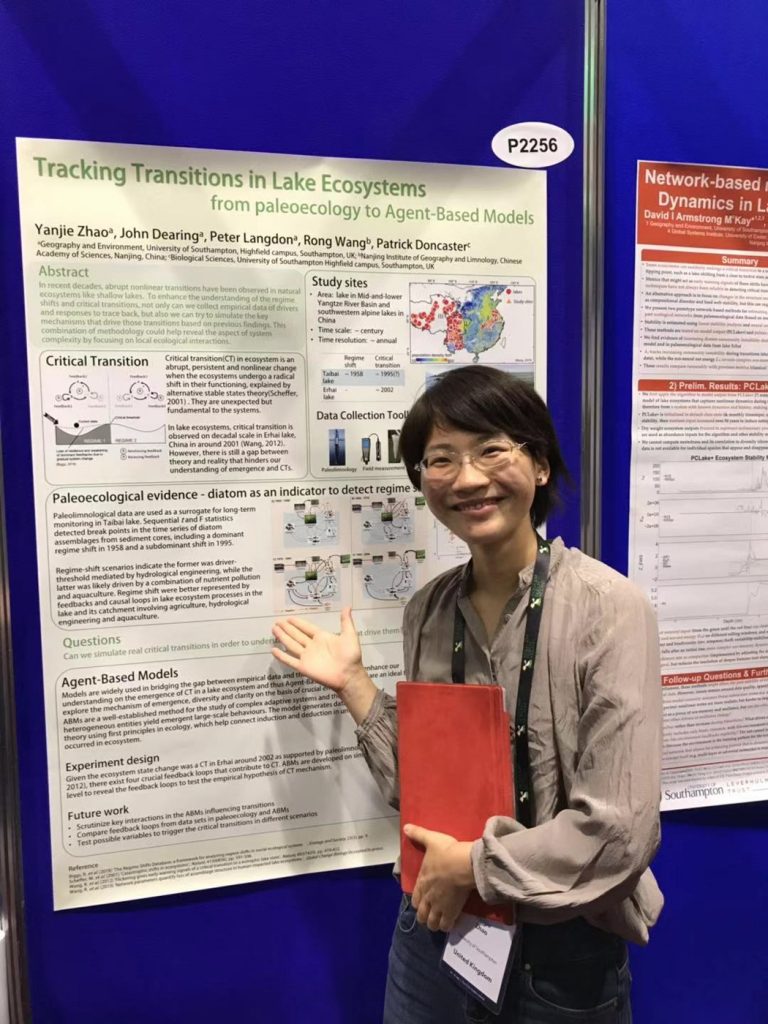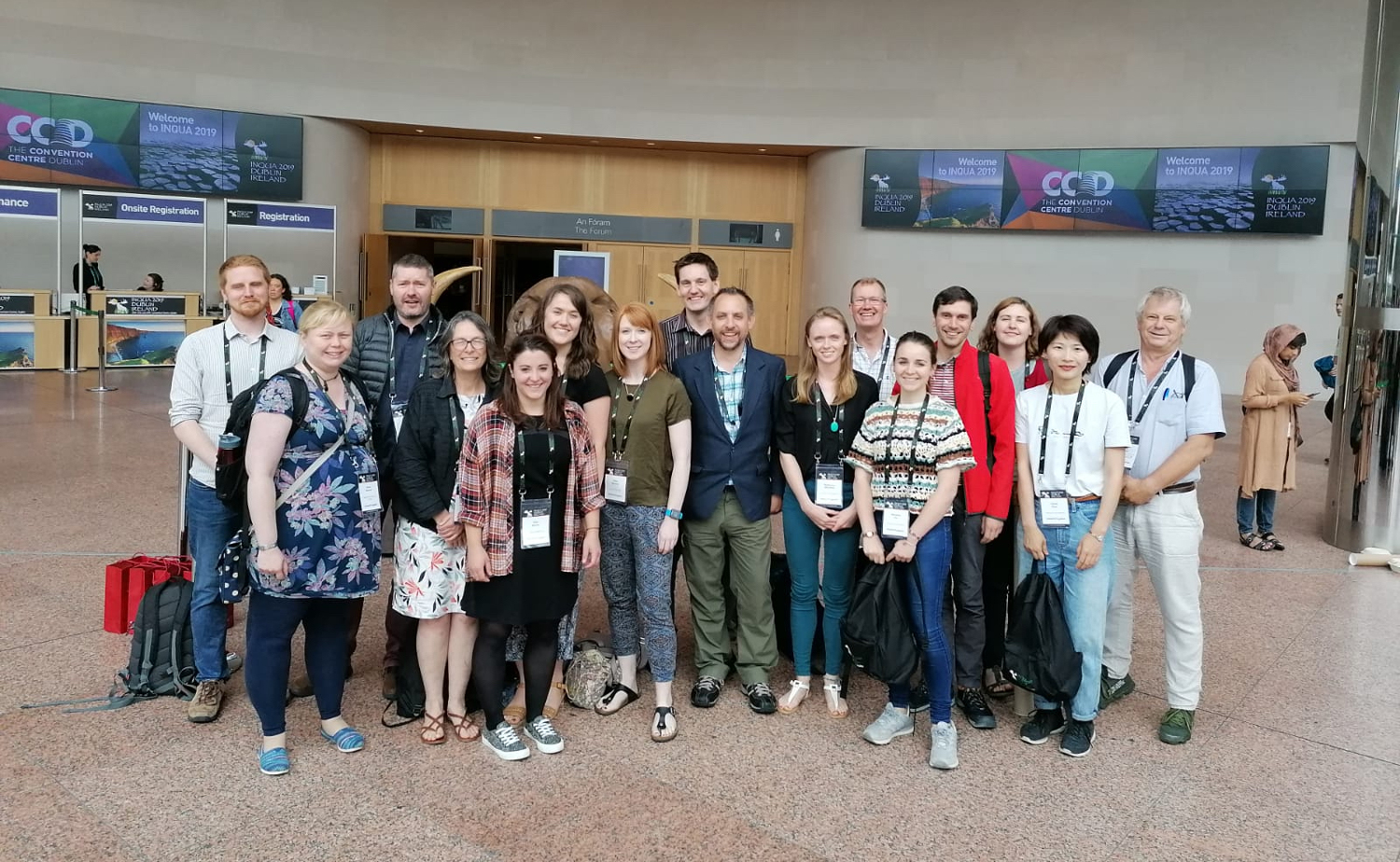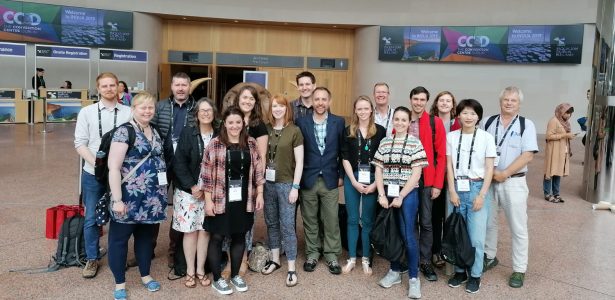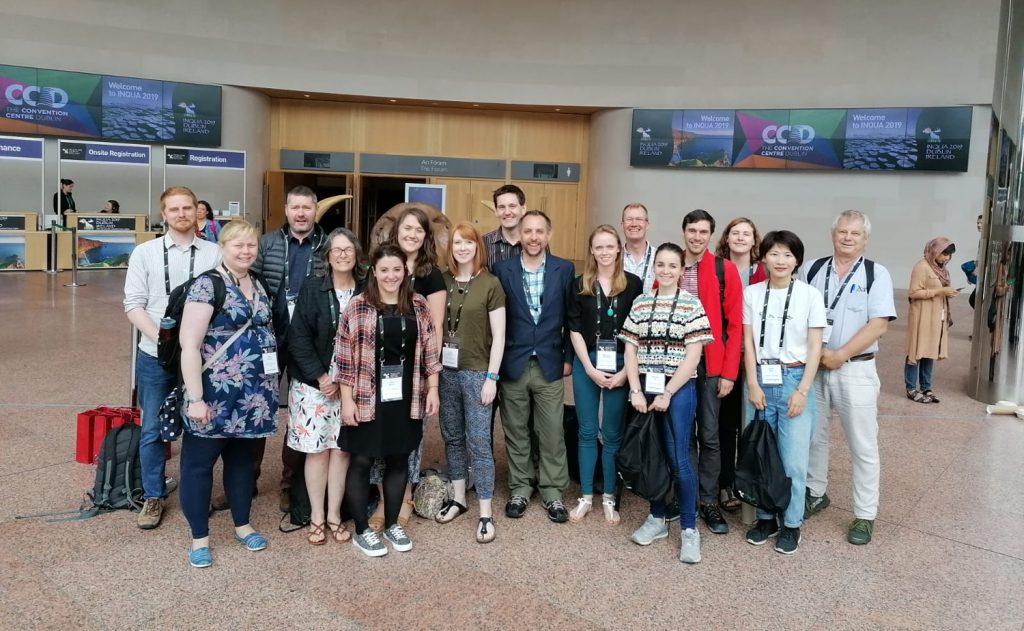INQUA 2019 – The International Union for Quaternary Research (INQUA) Conference is held once every four years and gathers together scientists from all over the globe to present, debate and refine our understanding of global systems over the Quaternary period (< 2.6 million years). This year the conference was jointly hosted by the Irish Quaternary Association (IQUA) and the INQUA organising committee and was located within the Dublin Convention Centre on the banks of the River Liffey. This year’s meeting took place at the end of July and was attended by around 2,500 people.
The University of Southampton School of Geography and Environmental Science was well represented at the INQUA 2019 meeting. Both existing members and alumni of the Landscape and Dynamics Research Group (including the PLUS group (Palaeoenvironmental Laboratory at University of Southampton) were in attendance.
Existing members and alumni of the Palaeoenvironmental Laboratory at University of Southampton (PLUS) group reunited at the INQUA 2019 Conference in Dublin, July 2019. From left to right: Dr. Thierry Fonville, Dr. Anna Bourne, Prof. Peter Langdon, Prof. Mary Edwards, Dr. Kim Davies, Charlotte Clarke (postgraduate), Dr. Helen Mackay, Dr. Michael Grant, Dr. Ben Pears, Roseanna Mayfield (postgraduate), Prof. David Sear, Majorie Fis (postgraduate), Peter Morgan, Nicola Strandberg (postgraduate), Yanjie Zhao (postgraduate) and Prof. Tony Brown. The conference was also attended by Prof Jane Hart (below) and Prof Paul Carling, as well as past Southampton Quaternary postgrads, Prof Dave Roberts, Dr Richard Waller and David Vaughan-Hirsh.
 Numerous sessions were chaired by existing (Tony Brown, Mary Edwards, Jane Hart, Pete Langdon, David Sear) and past (Michael Grant, Helen Mackay) LDE members throughout the week. Over 22 papers and posters were presented by existing LDE research staff and postgraduate students alone within sessions including:
Numerous sessions were chaired by existing (Tony Brown, Mary Edwards, Jane Hart, Pete Langdon, David Sear) and past (Michael Grant, Helen Mackay) LDE members throughout the week. Over 22 papers and posters were presented by existing LDE research staff and postgraduate students alone within sessions including:
- Drumlins- studies of a persisting enigma
- Do species adapt, move or die? Exploring biodiversity dynamics in the fossil record
- Ancient DNA from Quaternary and archaeological sediments
- Late Quaternary environmental change in the South Pacific: climate, ecosystem dynamics and human colonisation
- Resilience, stability and abrupt change in long-term ecological records
- Glacial and periglacial landsystems
- Abrupt climate change: The view from lakes
- Interpreting XRF core scanner records of natural and anthropogenic changes in marine and lacustrine archives
- Upscaling palaeoecological, archaeological and historical records of land-use and land-cover change
- Multi-proxy environmental archaeology: sedimentary remains and biomolecules as alternative to excavations?
- Palaeohydrology and fluvial archives- hydrological extreme and critical events (HEX)
- Subglacial processes and environments.
The research presented by our School of Geography and Environmental Science staff and postgraduates covered a wide range of topics with field locations stretching from high latitude regions in Alaska, Iceland and Russia, through Britain and Ireland, China and to remote islands in the South Pacific.
 A very special mention to current postgraduate student and PLUS member, Yanjie Zhao, who won the prize for best poster (€500) on the Saturday 27th July poster session. Yanjie’s poster was entitled ‘Tracking transitions in lake ecosystem – from paleoecology to Agent-based Models’, where empirical study and modelling approach are combined to reveal scenarios of ecosystem transitions.
A very special mention to current postgraduate student and PLUS member, Yanjie Zhao, who won the prize for best poster (€500) on the Saturday 27th July poster session. Yanjie’s poster was entitled ‘Tracking transitions in lake ecosystem – from paleoecology to Agent-based Models’, where empirical study and modelling approach are combined to reveal scenarios of ecosystem transitions.
Postgraduate student and PLUS group member Yanjie Zhao with her prize-winning poster at INQUA 2019.
Overall, the School was very well represented at INQUA 2019 and our staff and postgraduate students returned from Dublin enthused and ready to embark on the next four years of research leading to INQUA 2023 in Rome.



